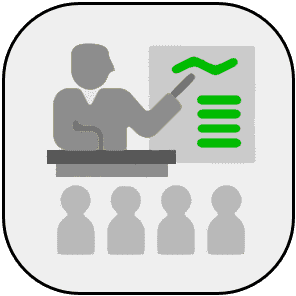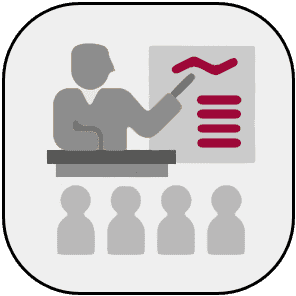What is Organizational Memory?
The Organizational Memory model of Walsh and Ungson can be used for information retention, acquisition, and retrieval in an organization.
Walsh and Ungson suggest that the structure of organizational memory can
be classified within six information "storage bins":

- Individuals,
- Culture (stories, mental models),
- Transformations (the various processes and procedures),
- Structures (roles within the organization),
- Ecology (physical setting of the organization), and
- External archives (information documentation).
Organizational memory refers to stored information from an organization
that can be used for current decisions. It is not centrally stored, but distributed
across different facilities where it is retained.
The model helps HRM managers to improve an organization's chances to exploit
better its memory potential, by shaping and influencing these memory locations.
Origin of Organizational Memory. History
There are several modern scholars who publish work regarding organizational
memory. But it is clear that the origins of this concept are based upon the
work of early twentieth-century scholars such as Durkheim and Vygotsky. According
to Wexler (2002), the notion of organizational memory originates from the
work of Durkheim and his protégé and was built upon the concept of collective
memory. Spender (1996) claims that organizational memory is inextricably
linked to the work of Vygotsky and social construction theory. He offers
the argument that socially embedded activity preceded the development of individual
consciousness (p. 71). Walsh and Ungson (1991) cite the work of March and
Simon (1958), who posit that the memory of an organization or institution
can be housed in policies and procedures. This retention characteristic
can also result in negative consequences. Walsh and Ungson (1991) also cite
the work of Starbuck and Hedberg (1977), who claim that structured artifacts
such as roles can do harm to an institution, when they lose their efficacy
over time and actually become impediments to change.
Usage of the Organizational Memory model. Applications
- Human Resources
- Knowledge Management
Strengths of the Organizational Memory concept. Benefits
- Gives a simple framework for guiding HR efforts in improving knowledge
management.
- Allows institutions to benefit from historical information and from
learnings. Despite the transient nature of organizational membership (Berthon,
Pitt & Ewing, 2001).
- Can serve as a competitive advantage (Wexler, 2002; Croasdell, 2001).
- Can actually reduce transaction costs (Croasdell, 2001).
- Can serve a political role in organizations. This can have both positive
and negative implications (Walsh and Ungson, 1991).
Limitations of Organizational Memory. Disadvantages
- A too high emphasis on organizational memory can disable learning in
an organization, causing rigidity and blindness: companies no longer notice
changes in the environment.
- Organizational memory is a function of an institution's age, size and
success (Sinkula, 1994; Lukas, Hult and Ferrell, 1996; and Berthon, Pitt
and Ewing, 2001).
- Prior history may cause habitual decision making and in
Single-loop learning
(Berthon, Pitt and Ewing, 2001).
- Artifacts such as roles and organizational structure, that are stored
within the culture of institutions, may also become impediments to change
(Walsh and Ungson, 1991).
Assumptions of the Organizational Memory model. Conditions
- According to Walsh and Ungson (1991), when you think about organizational
memory, you must consider three critical factors: retention, acquisition,
and retrieval.
|
Forum discussions about Organizational Memory.
|
🔥
|
Organisational Memory Blocks Innovation
I have found that memory is always the worst deterrent for accepting new challenges - for welcoming new recruits, new ideas.
Memory is good only for history writers - in an ever changing market envir...
 3  2 comments |
|
|
|
Courses about Organizational Memory.

Beginners Course
|

Advanced Course
|

Course for Experts
|
|
|
|
The best, top-rated topics about Organizational Memory. Here you will find the most valuable ideas and practical suggestions.
|
|
|
Advanced insights about Organizational Memory. Here you will find professional advices by experts.

Consultancy Tips
|

Teaching Tips
|

Practical Implementation Tips
|
|
|

|
Barriers that Hinder Effective Knowledge Sharing Effective Knowledge Sharing, Pitfalls to Avoid, Knowledge Management Implementation
According to Chris Collison, there are seven common barriers or syndromes that hinder effective knowledge sharing and se...
|

|
Strategies to Change Employee Habits, Hearts and Heads Changing Organization Cultures
According to J.E. Kee and K.E. Newcomer ("Why Do Change Efforts Fail? What Can Leaders Do About It?", The Public Manager...
|

|
How to Identify and Map Knowledge Knowledge Identification, Knowledge Capturing, Knowledge Storage
In his article “Knowledge Mapping: The Essentials for Success”, Wesley Vestal provides following six tips to identify an...
|

|
Pitfalls and Best Practices in Culture Change Changing Organizational Cultures, What to DO and what NOT
According to Jon Katzenbach and Ashley Harshak ("Stop Blaming Your Culture", strategy+business, Spring 2011, Issue 62), ...
|

|
Critical Activities to Build a Learning Organization Implementing Organizational Learning, Best Practices
Learning organizations are distinguished because they are undertaking certain activities to foster the internal learning...
|

|
Knowledge Management Scope Knowledge Management, Level of Know-how
Research by Deishin Lee (HBS) and Eric Van den Steen (MIT) shows that recording mediocre know-how can actually be counte...
|

|
Knowledge Management Focal Point Knowledge Management Focus
Research by Deishin Lee (HBS) and Eric Van den Steen (MIT) shows that information about successes is typically more usef...
|

|
PROs and CONs of a Strong Corporate Culture Corporate Culture Change, Change Management, Organizational Change
Implementing a significant change is generally easier when the corporate culture is not strong. By strong Corporate Cult...
|
|
|
|
Various sources of information regarding Organizational Memory. Here you will find powerpoints, videos, news, etc. to use in your own lectures and workshops.

|
Organizational Forgetting and Memory Organizational Memory, Organizational Forgetting
This presentation elaborates on the concept of organizational memory, and includes the following sections:
1. Introduct...
|

|
How to Integrate Internal Organizational Knowledge with External Online Communities Knowledge Management, Knowledge Creation, Knowledge Sharing, Interaction, Knowledge in Organizations
Due to many online and web-based technological developments in today´s digital economy, sharing knowledge in online comm...
|

|
Three Levels of Knowledge Management Initial Understanding Knowledge Management, Organizational Learning
According to Jury (2007), knowledge management can be categorized into three different levels, and organized in a pyrami...
|

|
Knowledge Management Systems Architecture Knowledge Management, Knowledge Creation, Knowledge Systems, Knowledge Architecture
This presentation is about knowledge development and management, including the following sections:
1. Overview
2. Know...
|

|
Introduction Into Organizational Memory Organizational Memory
Introduction into Organizational Memory, including the following sections:
1. Organizational Memory (OM): definition
2...
|

|
Organizational Memory Diagram Information Management
Download and edit this 12manage PowerPoint graphic for limited personal, educational and business use.
Republishing in ...
|
|
|
|
Useful tools regarding Organizational Memory.

News
|

Videos
|

Presentations
|
| |

Books
|

Academic
|

More
|
|
|
|
Compare with Organizational Memory:
Bridging Epistemologies
| SECI model |
Knowledge Management
(Collison & Parcell) |
Five Disciplines |
Organizational Learning
| Mechanistic
and Organic Systems |
Action Learning |
Levels of Culture
|
Changing
Organization Cultures |
People CMM
| MAGIC
Return to Management Hub: Human Resources
| Knowledge & Intangibles
More Management Methods, Models and Theory
|
|
|














